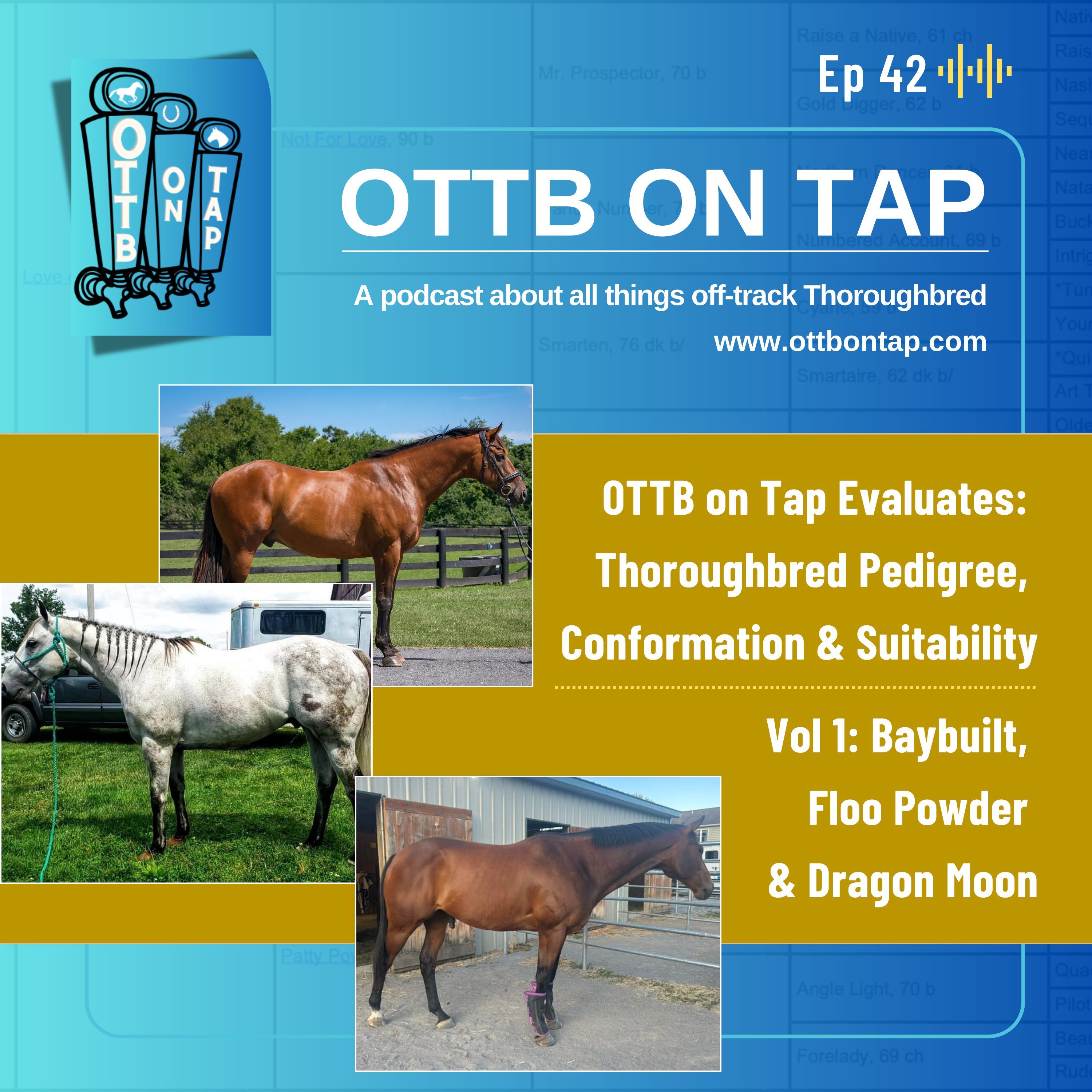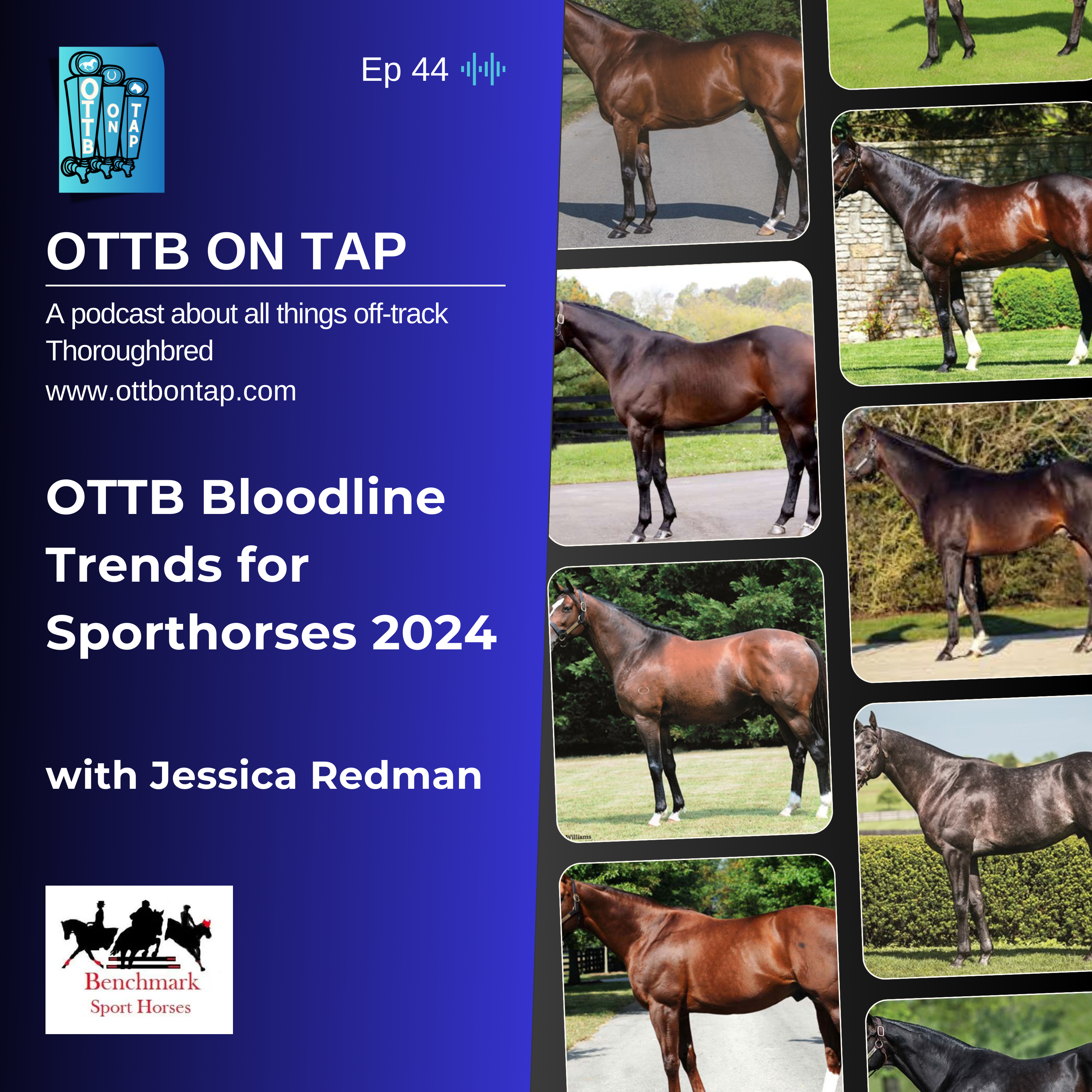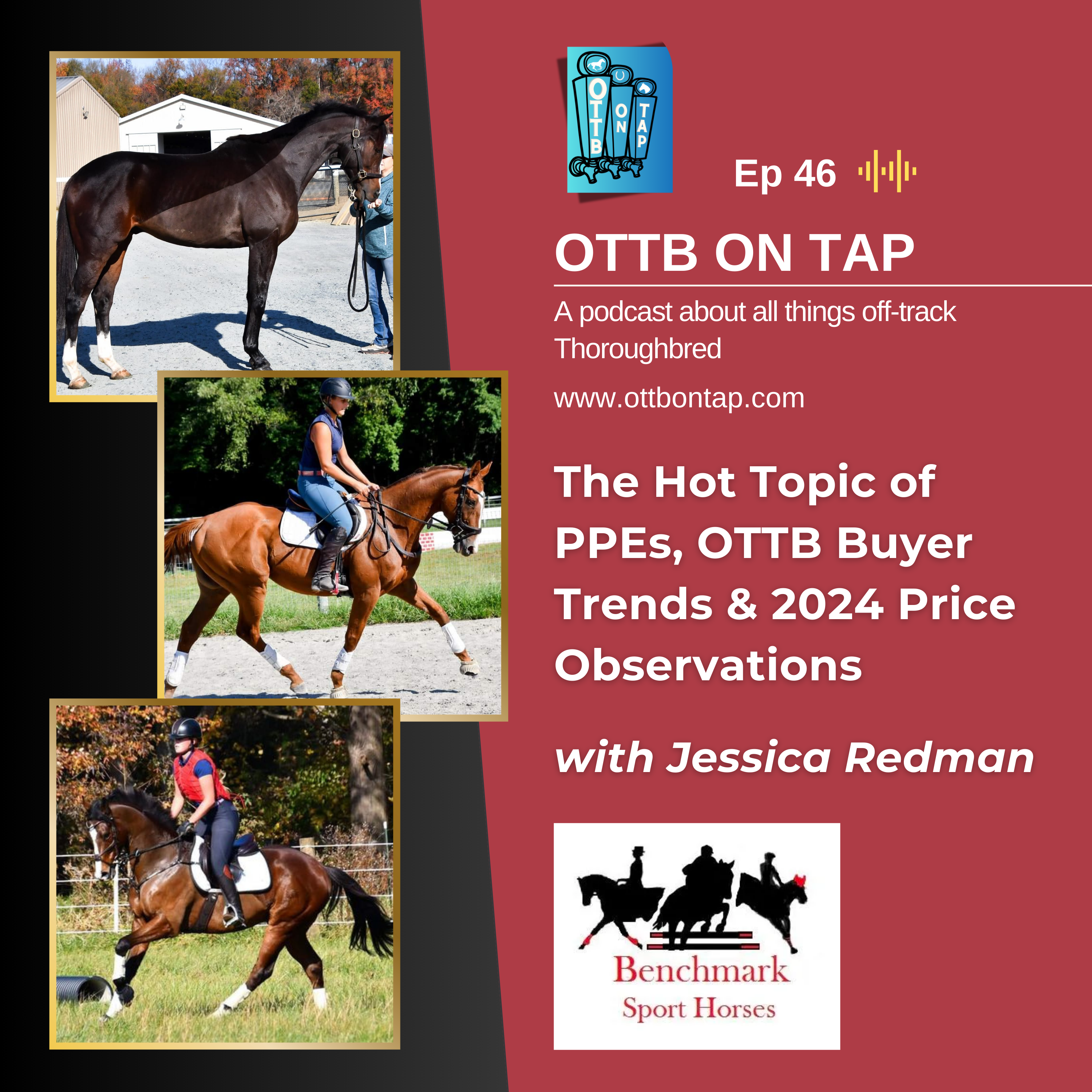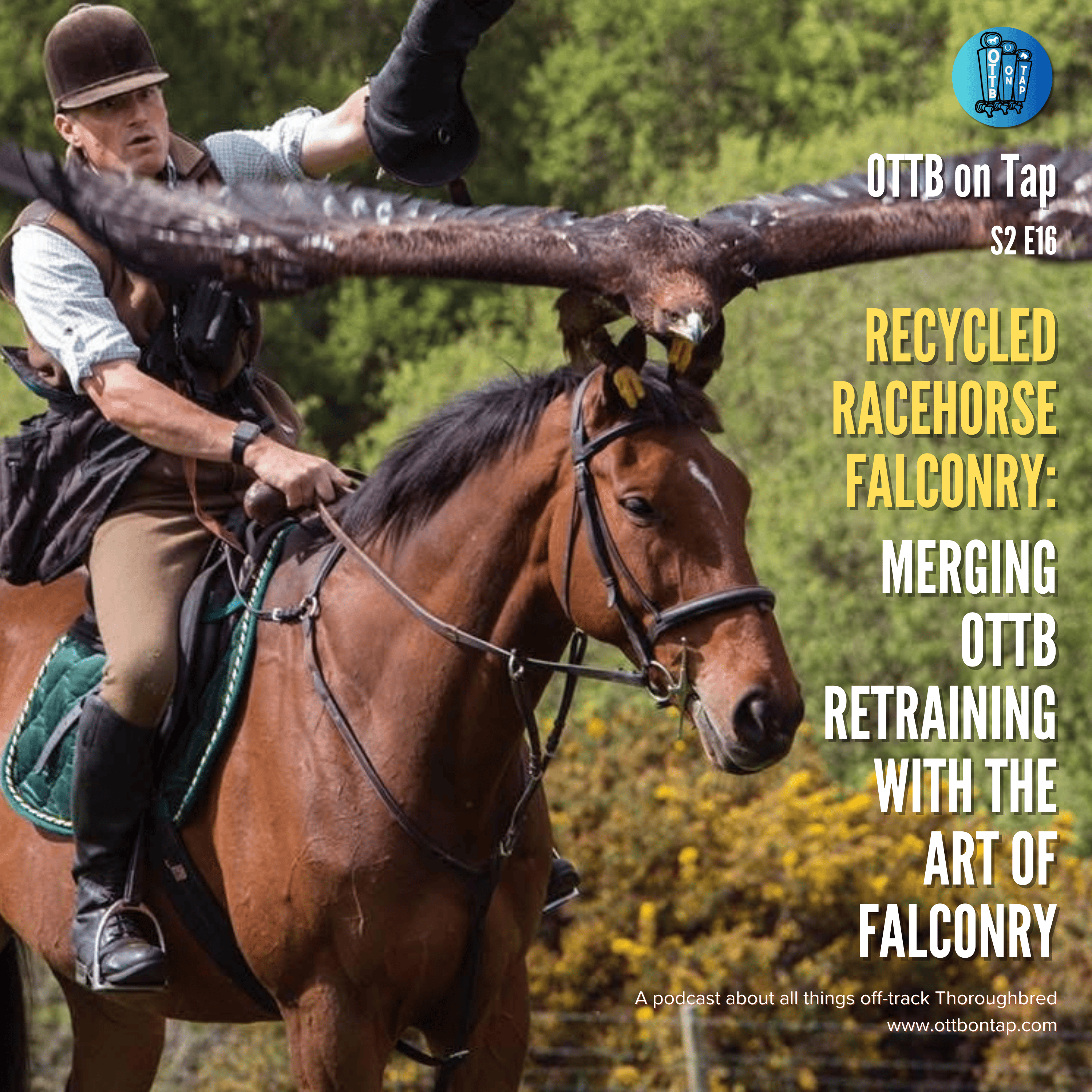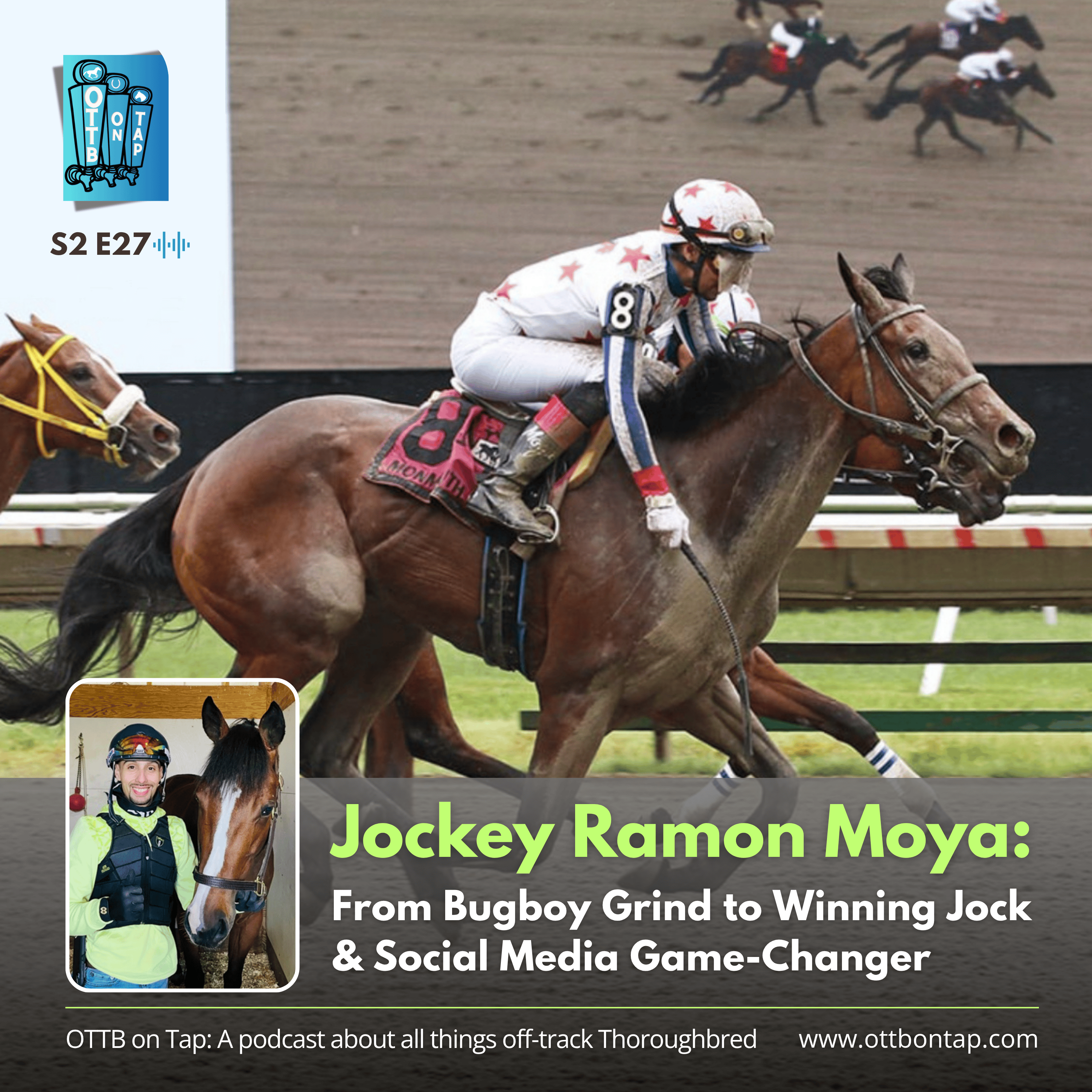S2 E26: Not Just for Warmbloods: Harley Whittaker on Dressage with OTTBs
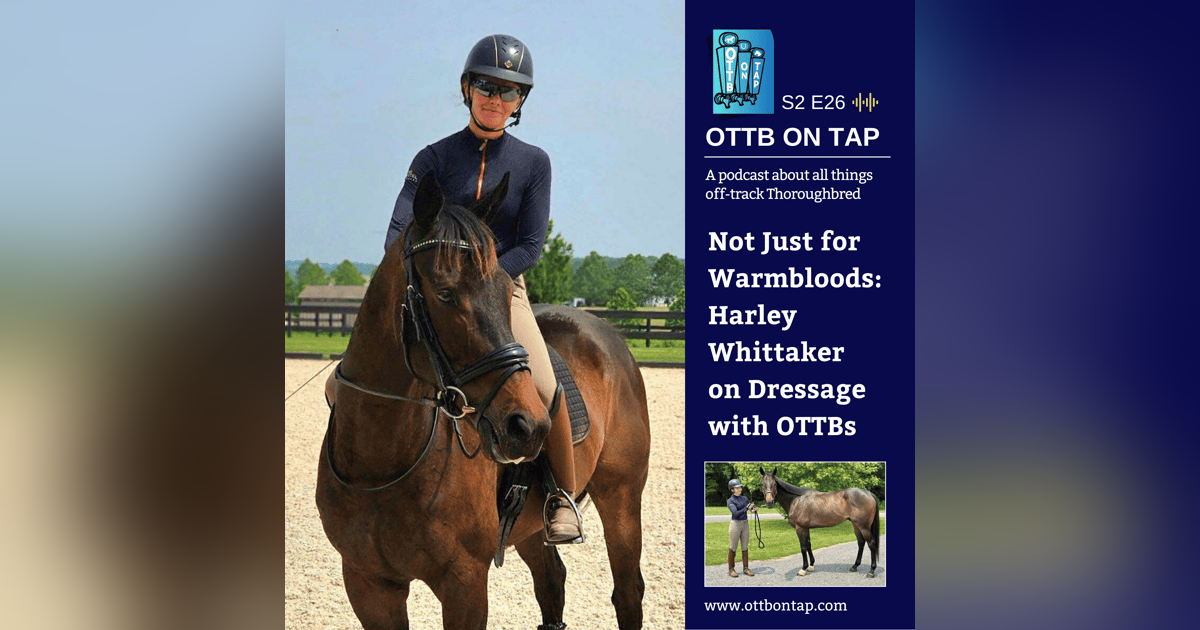
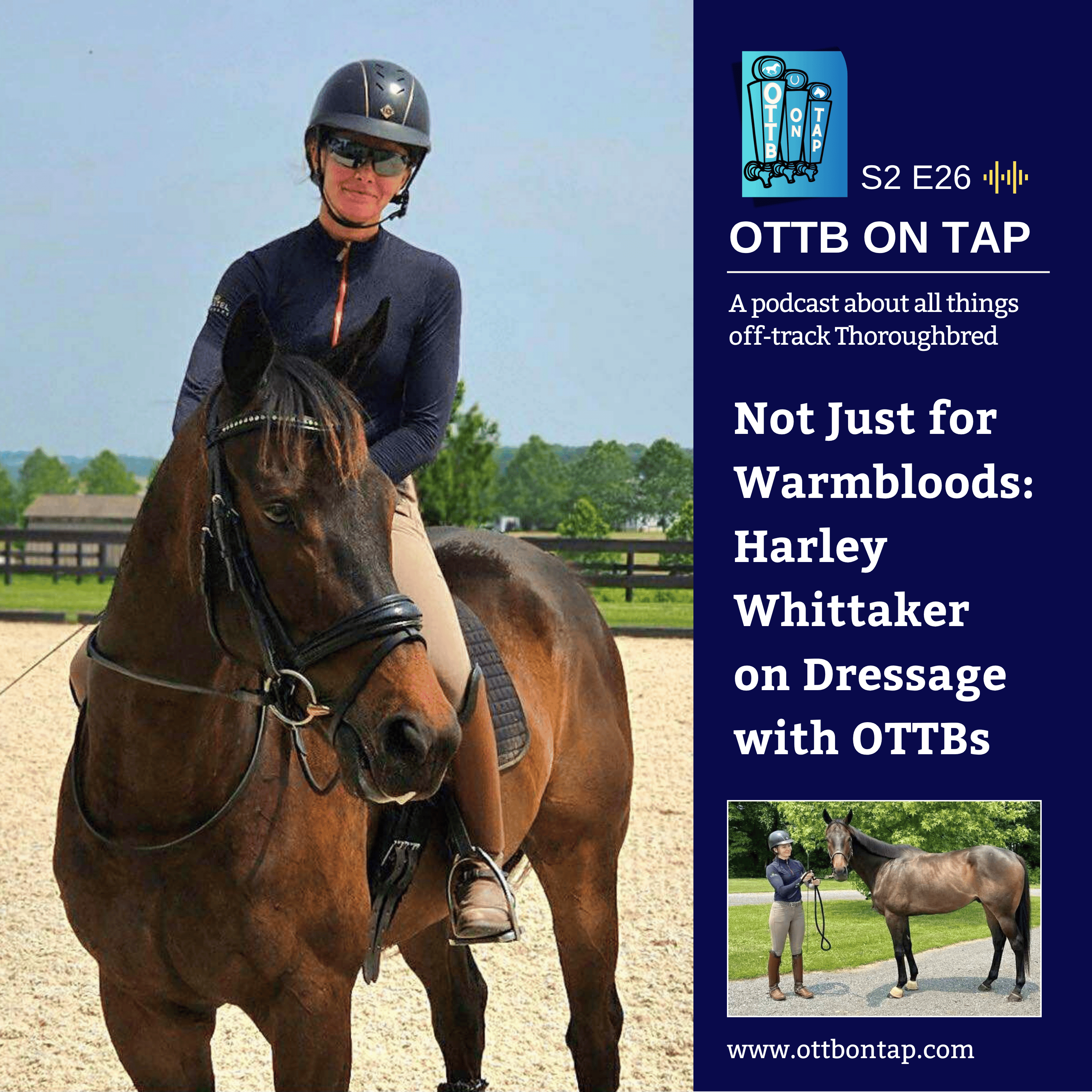
Welcome back to RRP Trainer Chronicles, an OTTB on Tap Original Series following the riders and retrainers headed to the 2025 Thoroughbred Makeover. In this episode, we’re talking dressage, Thoroughbreds, and that all-important seat with Harley Whittaker of HW Dressage in Kirkwood, Pennsylvania.
Harley didn’t grow up in a horsey family, but she’s built a thriving training business rooted in thoughtful, individualized care—and a belief that OTTBs absolutely belong in the dressage ring. She introduces us to her Makeover partner Juancho (aka “Jack”), shares what she looks for in a dressage prospect, and walks us through the early days of training a horse fresh off the track.
We chat about visualization, confidence-building, ulcer prevention, and why pulling back is not the answer. Whether you’re new to OTTBs, curious about dressage, or just here to root for a great horse and rider team—you’ll love this candid and inspiring conversation.
S2 E26: Not Just for Warmbloods: Harley Whittaker on Dressage with OTTBs (Transcript)
[00:00:00] Hi everyone, and welcome back to OTTB on Tap. I'm Neve. And I'm Emily. Hey Neve. What's on tap today? Today we're continuing our 2025 RRP Trainer Spotlight Series with Harley Whitaker, a dressage trainer based in Kirkwood, Pennsylvania. Harley's passion is proving that thoroughbreds can shine in the sandbox, and we're so excited to have her on to share her journey to the makeover.
Harley, welcome to the show. Thanks for having me on. I'm excited to be here. Awesome. We are so excited to have you too. Let's rewind to the beginning. How did you first get into riding and what brought you to the world of dressage? Yeah. I definitely didn't come from a horsey family. I didn't start with horses until I was about in sixth grade.
But I always loved animals and horses in general. I had a friend who volunteered at a therapeutic riding facility close to where I lived and I joined her there and learned as much as I could. [00:01:00] I ended up spending as much time as I could working to ride, becoming that crazy horse girl. And from there I worked at a few other barns and ended up finding a dressage farm in Oxford, Pennsylvania when I was in high school, and that's where I really caught the dressage bug.
And was dressage your first love or did you come to it after exploring other disciplines? I dabbled definitely in some jumping and cross country first I thought jumping was the most fun thing ever, and I thought dressage was the most boring thing ever. Typical. A lot of people start out that way.
Yeah. And then you start getting older and you're like, wait a second. Yeah. I think it was like. Even just being able to sit on an upper level horse and feeling those movements. I got extremely obsessed with recreating that feeling. Yeah. So that's what really hooked me. That's really cool.
Yeah. That's really amazing. And so you're not just riding, you are a professional trainer now. Tell us a little [00:02:00] bit about your business and the types of horses and riders that you work with. I own HW dressage, LLC, and it's a smaller dressage competition barn that's very focused on individualized training and care.
I'll work with any horse and rider who wants to put in the time and effort to get better, whether that's training level or the upper levels. Even inventors, whatever. The horse's care comes first and I feel really lucky to have the best clients ever and I love all the horses I have in training as if they were my own.
So I'm just really grateful to be where I am. I think it's really nice that you have a program that you've adapted to suit many different types of riders and not just upper level riders, because I think for me, I went to dressage at Devon for the amateur show with my quarter horse a couple of years ago, and it was such a bucket list item to check off and I was just doing a couple of training level tests.
But for me it felt like the Olympics and I prepped for it, like it was like the most important [00:03:00] show of my life and I, got my horse and myself all decked out and I think. There's so much to be said for people that are at a certain level, but they wanna be the best at that level. Yes.
And so it's really cool to be able to find a trainer like you that can actually modify their teaching for multiple types of levels. I love that. And honestly, it's also a little bit selfish because I love the basics so much and the more you learn, to do things at the upper levels, you realize how much the basics play a role in all of that.
So for me, that's my bread and butter. I love working on transitions. I love working on the very, very basic things and helping people and have that light bulb moment, where everything clicks in like that. Yeah. Love it. Oh, that's awesome. What inspired you to focus on bringing Thoroughbreds into the dressage world?
It's not the most traditional path for an off the track thoroughbred. I think you get, say, and have the most traditional journey in Germany where I'm now. I just really [00:04:00] have a place in my heart for dressage being for all breeds. I've done past massage on Arabians and one Tempe on Kaari ponies and it might not look as impressive as it if it were on a fancy warm blood to the average person, but I think there really is no limit to teaching a horse no matter what breed, how to use themselves.
In a more effective and relaxed way. I have a horse in training right now. She's been with me for about three years. She's a thoroughbred mare. And she is 23 years old. You would never know it by looking at her. You would never know it by riding her. And she has a little sprinkle of arthritis here and a little bit of this here, but she.
Just gets better and better every day. And she loves to work. She loves to go to shows. She doesn't score the best all the time because of all of her little sprinkles of things here and there. But that will throw herself on the trailer. You can spit her out anywhere at Devon at, any showground.
And she is like, all right, [00:05:00] let's go. I'm game. Let's go. Oh, that's so awesome. Yeah. I think dressage training, especially for those older horses that really want a job and wanna keep going, I think it's gotta have some impact on their longevity over time. It's just like people though, right?
Motion is lotion. As you get older, if you stop doing your basic foundational movements like squatting or bending over, if you don't do that, you're gonna lose it. Yeah. So it's the same with the horses. They need to keep moving if you wanna, keep 'em limber.
Yeah. Yeah. I think that's my favorite thing about the thoroughbreds is just they're, that they want to work, like the Mary you were just talking about. You don't have to get them out of bed and encourage them and they're like, okay what? What's next? Yep.
Let's do it. Me. Pick me Joke about that one. Because I don't think she'll ever be able to be retired as a non riding horse if she is not ridden. Like one of the first horses in the morning, she's weaving in her stall. Excuse me, it's my turn. Get me out. Gimme something to do, please.
Yeah. I think she'll retire of hacking, but I [00:06:00] don't think she'll ever be able to just sit in a field, just sit out. Yeah. So when did you first realize that Thoroughbreds had the movement, the brain and the heart to succeed in dressage? Yeah. I can't think of a specific moment, but I think being around them so much and just seeing how versatile they are and now having that mar in my barn has really, yeah.
Sold me on that.
Are there any particular bloodlines or confirmation characteristics that you look for in particular when you're selecting an OTTB for dressage? I also have follow up to this question okay. I'm gonna be completely honest. I'm so out of my element with the thoroughbreds.
I have no idea, of their bloodlines. I hear little things here and there and I know storm Cat is in. Ponchos lines there. And people either love or hate that. So I don't really look at the bloodlines confirmation. Definitely I'm looking for something with a good hind leg and shoulder, a ground covering walk, just decent, basic gaits.
[00:07:00] I can definitely make a tr better. I need something with a good brain really too yeah. Yeah. I, my follow up question, you answered it, but , Emily and I are . Huge just studiers of horses from a confirmational standpoint, a pedigree standpoint, watching jog videos, watching free movement videos.
And we're very specific about what we, hone in on when we're looking at these horses. And I'm just curious of is there anything beyond what you just said that you might look for in a jog video? I know . When I posted the video of Oscar from the track, it's a trot video, and then he turns and walks and goes into the barn, and I said to everybody , oh, I bought him because of the walk into the barn, like he sounded sound.
But I like the walk. And so for me that says oh, he is gonna have a better than average cantor probably. Yeah, the walk is definitely the one thing that you really can't change. So a good walk definitely. But I think overall like presence. Yeah. I think if you. Horse and watch it go. Like you can tell a little bit [00:08:00] because the horse that I have is, he's actually doesn't have the best confirmation.
He has a low set neck, he's got a pencil neck. His back is really he's really not the most beautiful animal, but I know that he will be the most beautiful animal when I'm done with him. But so I don't always go for like perfect confirmation, but really I do want a good hind leg. Yeah. I want a good shoulder.
And I look at that overall presence, yeah. That sounds familiar, right, Emily? Yeah. I'm over here googling your horse, Wacho. Yeah. So I was gonna say, we actually had a horse come through our program years and years ago, and we've talked about him before a couple times on the podcast, but we went to go look at him on a freezing cold day and he had been on just stall rest.
It's what they do with all their horses. And we liked him immediately. We just thought we'll just go drive and go look at this horse. They pulled him out and they're like we'll see if we can trot and we're not sure. And they did, he did two steps, four or five steps of trial, and we were like, okay yep.
We'll take him. And I think he, he did Precinct George. [00:09:00] Grand Prix dressage. Yeah. He went up pretty high in the levels. Yeah. Yeah. So it's just, there is just so much like that horse, the presence we did, he wasn't for sale for a while because we weren't really sure what to do with he was too good looking.
You like couldn't handle even like looking at him. But we'd be trying to show horses to clients and he would be like. Hello. I'm over here and he'd just come over and do this really fancy, extended trot and you were like, you are not for sale. Go hide yourself. He couldn't help himself.
He wanted to be on show. Yeah. Nice. That's really cool. Let's talk about your RRP partner. How did you find your horse for this year's makeover? So I definitely didn't do this in the correct order. I got the course first as I said, for a resale project. The client that I have, she just jumped on board with the idea of having a thoroughbred resale.
And then once. I found this guy and decided that I was going to go with him. I think I [00:10:00] had four days between the time that we decided to purchase him and the application deadline. And like I said, I'm like outta my element, so I didn't know exactly what all that entailed, which is actually pretty crazy.
Yeah it's pretty detailed, that letter and all that. So I was like, okay, we got some work to do here. So I found him first and then decided it would be fun to do the RRP. And now here we are.
And I think you mostly answered this, but what drew you to this particular horse? Was it movement, build, temperament, or a little bit of everything? Yeah, I think it was a little bit of everything. Yeah, definitely. He moved really well. Everyone said he had a good temperament. It looked like he had a good temperament.
And then also on top of that, just his barn name was Jacks, which is also my heart horses. Name Jax. And so we all decided that [00:11:00] was a sign and we were going to go with it. And did you choose your horse you just answered this because I guess you chose him first. And as a dressage rider, I guess you always had dressage in mind, but had you thought about doing anything, any other discipline at all?
Definitely not. Definitely was not gonna go jump or do anything else. I was looking at the RRP and all the different disciplines and I was like, wow, they have a lot of things in here and I am just gonna stick to what I know. Yeah, no, that's smart. I'm gonna just throw this in here 'cause I just looked up one show.
Yeah. I wanna know. And yeah, so he ran 11 times. He was a winner. I don't have his, I'm in the pedigree. Hang on. How much money did he win? I don't think he won a lot. Oh, he won 48,000 in 11. That's pretty starts. Yeah. That's pretty good. He won two races and he is by, I have no idea how to pronounce this.
Ei? Yeah. Good. ELU try. Oh, [00:12:00] E-L-N-A-A-W-I. Anoe Elna. Elna. We elna we is by street sense though is by street cry. So that is a fantastic sport. Horse line Street Sense by Street cry. Street cry. If I could talk by Machiavellian is a really cool line that infuses some Irish blood in there through Street Cry.
They can be a little bit tough, but they're usually really athletic. Nice moving. Not always the biggest horses. So that kind of fits. Very little in breeding, which I love. He has the dam is I wanna win IJUA and win by city place by storm. Yeah, like a lot of really good, athletic in here. Nice. Athletic horses. Yeah. Yeah. And some older blood too, which is really cool. Up close. I love seeing the older blood because it tends to, and like the lack of inbreeding, because I feel like they just have a broader genetic [00:13:00] profile and they tend to be a little bit sounder and heartier, so he seems really cool.
I'm so glad I have you guys to help me. We're such nerd. Just outta control. I dunno. I like that one. That's how you start though, and then once you very soon will be looking at all of the ads on Facebook. 'cause they just keep coming. The algorithm loves you now. Yeah. And then, if you start looking at pedigrees of the horses that you like, and it's the same as anything else, you just start to see which ones you like.
Yeah. But yeah, anyway, and you start to notice some really cool confirmational characteristics as well. Like sometimes they'll throw all different sizes, but the one thing you'll always see is a shoulder that you can see from space, or something like that. So it's very cool to start like, we'll actually play this with each other where we'll see a picture of a horse and she'll be like, who's it by?
And then we'll try to guess who it's by, because we've just looked at so many of the, apparently we're very bored. Yeah. Get a life. You two. We should make like flashcards storm cat. Oh [00:14:00] my God. Yeah. Allar. Yeah. Anyway getting off track here. Let's continue. Once your horse came home, how did the restarting process unfold?
Did you have a plan or did you play it more by feel? What was it like getting on him for the first time? All that good stuff? Yeah. I think before I had a plan, I think my plan was to just see how he was at first. And then formulate a plan. I wanted to meet him and. Go through a little bit of a checklist.
And so I was in South Carolina for the winter, so he actually came down from New York and Oh wow. We also had my soul crushing winter had some snow in it in a Carolina. So he came down, you poor thing. I really roughen it naked. You should feel very bad for me. So when he came down, I think I actually, the first time I sat on him when was, when it was snowing, but he came from New York where I'm sure it was like way worse.
So he was quite good in the cold. Cool. . So [00:15:00] now that you're back in Pennsylvania I don't know how many months you've been back for, but this winter has seemed like it never ends, and it's been so windy and so horribly cold, like it hasn't been in years.
How has that kind of factored into your retraining or the early days of your retraining? Yeah definitely some small, positive investments is what I call it. Very short rides. Yeah. Short and to the point, but yeah. Holy wind. Yeah, it had been so windy. So I was a little curious to see how he would respond to that, but he's actually great in wind, even for per hour wind gusts, so that's good.
Check that off the box. Yeah. Really great. So I would say weather-wise I think. Again, he has a really good head on his shoulders, so I've lucked out a little bit with him. I think he's better than some of my warm bloods with the weather. So yeah, the weather was interesting, but he's been a trooper.
Yeah. I have to call him Wacho just because it's so funny. Has Wacho gone [00:16:00] to any outings or shows yet? So it's interesting because I normally would've taken him to probably a couple places by now. But because he came from New York and then went all the way to South Carolina, and so I had to get used to him a little bit in South Carolina and he had to get used to a whole new place.
And then we came home to Pennsylvania, so then we had to get used to a whole new place again. I really just want, it's a lot. Yeah, it was a lot. And I obviously got to see him in new environments a couple times. And I wanted to spend a little more time just building a relationship with him after that.
'cause even though he's good and he took it all in stride I think he was a little bit like. Cautious, what's gonna happen next? Yeah. And so I just wanted to give him a little bit of time. And like I said, he was a little skinny. He had underdeveloped back, he needed just time Yeah.
To understand what was gonna be asked of him. So I feel like now we're at a place where I'm gonna start taking him a bunch of places. And we have a little [00:17:00] bit of a relationship now. So now we'll probably start doing our outings. Yeah, I think I am in a fairly similar place. Like I was saying, we started off like with just letting him settle in and then like we were actually going pretty good, we're gonna lessons like once a week, and I took him to a couple different places and then, I don't know, it was like the weather got a little bit better and he just fell off condition wise a little bit.
He came off the track like a. Tight, bouncy ball of muscle. And once he lost, truly lost all of it, I was like, oh wow, this is really, and I haven't really had a horse that changed that much in a long time. So it's been that kind of slow process of not driving yourself crazy every day when you see them every, all the time, you're like, God, just grow muscles, , eat more food, it mostly. Yeah. And it's, and especially when I'm a really good visualizer, so I can see the future horse in there and I'm sure you're the same way where it's like you can see how the horse is gonna develop and you just want so much for them to have all of those components so they can better support themselves and support a rider.
And [00:18:00] it's hard to be patient sometimes. Absolutely. Yeah. I can definitely relate to that. Yeah. So we're gonna talk a little bit about makeover mindset and progress. So it's still early, that clock is ticking a little bit to get to October.
How are you feeling about the timeline for the makeover? I feel. Okay about it. I feel good in that. Coming from a dressage perspective, the training level tests, I feel that's plenty of time to get that taken care of. But I wanna make sure I have enough time to get him out to places and get him confident in a bigger atmosphere.
But I'm really just focusing on one day at a time, one week at a time. I try not to think about October. October. I know we're just here to remind you. No. Or you'll have people be like, 171 days to go and I'm like, knock it off. Yeah. I [00:19:00] do not need that ticker tape in my head.
Thank you very much. Are you more excited, nervous? Motivated or some kind of combination of all of those? Yeah. I'd say I'm pretty excited. I don't really get nervous for competitions, but I have to say thinking about over 300 brs in one place for a week is a little bit intimidating. Especially as someone who's never been before, a little nervous on that front, but excited about being able to go and take him and do the thing. Yeah. Yeah. One the same boat there the last year, last time I went, I think it was 2017, and I got there and it was my horse's first show because that's how I do, I don't know, not the best planning.
Anyway. Also, they were having a like a CDI driving competition. Oh. And my stall was right on the end of the row where [00:20:00] all of the drive all day long. Oh no. Foreign hands, Shetland ponies oh no going by. I believe they've resolved that. Stopped scheduling conflict, but I was like, I am going to die. And it was fine.
He actually handled it brilliantly. It was unbelievable how well he handled that situation. But yeah, that could have been, yeah. Yeah, I can't imagine it was quite eyeopening. Let's just put it that way. If you wanna come to Kirkwood, pa, we have a lot of Amish buggies. Yes. I was gonna ask see a of those, a lot of my horses do not like them.
But he has seen quite a few of them now. If that happens when we go, we will be okay. I used to have my last thoroughbred was in training down in Oxford, and we would go for trot sets out on the roads and you would have to go through some farms with cows and then come out and you just never knew if there was gonna be a horse and buggy around a blind turn, and you're like, guess we'll see what happens. Yikes. Yeah. Yeah. And Emily had her young horse, I [00:21:00] meant to ask you this before we started, but I, so last year my young horse that I bred, I had her at Robin Weaver's to get broke. Yeah. And Robin's is on a corner with the Amish just going right by.
So it's interesting. I can really see Robin's place from Oh, nice. So you're really close to us. That's really cool. Yeah. Yeah. Shes right to an Amish person with a lot of Amish buggies. Yes. Yeah. So they get to see a lot. Yes. Yeah.
All right. Back on track. What is your philosophy heading into the makeover? Is it about showing off the polish or more about the partnership that you've built? I think it's more partnership. It's more about my job as his rider and trainer, to set him up for success and looking at it as.
Overall, the bigger picture, I just wanna make sure that I get him out to places he is confident and I do everything I can to make sure that environment is not a big deal to [00:22:00] him. Gotcha. So you said that you don't really get nervous for competitions. I would love to know what that's like.
I know what a healthy dose of nerves. I wouldn't say totally fine, but yeah, but I generally am. Okay. Yeah. Is there anything that you like to do mentally to prepare for big events? Like there are off in the distance, like the RRP. Sure. Visualization for sure.
Yeah I will visualize doing that test a bunch of times because actually if you try to visualize yourself doing something, whether like for us it's whatever riding wise. But anything in the real world, if you try to envision yourself doing something perfectly, it's alm it's like really hard.
You get like halfway through it and you automatically start thinking about a mistake. And it's interesting and I learned about that I think on some podcasts, but visualization is huge. And so I will sit there and it'll take me probably an hour just to run through that training level test at the RRP in my head.
Perfectly. Yeah. But I do think [00:23:00] that helps. For some reason. Yeah, no, it really does. I think I realized this at dressage at Devon when I went to trot down my first center line that I had never ridden in a large dressage court. Before. So I had only practiced the test in a small arena. Yeah.
It's very different. And I was like, this center line is 65 miles long. So big. But I, after I got over the fact that I was like, oh shit. Where am I? Letters and where do these other letters come from? And I had been watching there's a girl, I forget her first name, her last name's Newcomb Dressage.
And she's got some really great videos on YouTube where she'll actually show you where to find like the points of your circles and stuff. And so I had watched some of her videos to learn the test. And so that was really helpful. But I remember at some point being like, but now I have all this time to prepare for these transitions that I was so worried about.
And it just gave me a lot of confidence actually. Once I got over the scale of the ring, then I was like now you can come [00:24:00] in here and really nail every single transition and movement and everything like that. So I think it really does help to. Have worked through a lot of that stuff in your brain before you actually send yourself down center line.
Absolutely. It's funny too, , I actually have a harder time remembering the training level, like lower level tests than I do the upper level test because you have so much time. In between okay, a n or Excel salute. Okay. And then 20 meter circle at E and there's so much time between us.
Wait. Shouldn't I be doing something else right now? you're like, I feel like I should just half pass over to that. That seems yeah, it's way harder to remember as a training level test than it is to remember a pre Saint George or third level. That's interesting actually. Okay. I do half pass circle, whatever.
But it's funny how that works. Yeah. For listeners who dream of bringing an OTTB into the dressage ring, what's one piece of advice that you'd give them? Take your time. I think [00:25:00] that having a thoroughbred you need to take your time with it. You don't have to try to make it do all the things right away, but I think if you spend the time doing the foundational stuff, laying that foundation, building their confidence.
Getting the relaxation then they have the work ethic and intensity and that will come back, tenfold later on. So just take your time. And do you have a favorite exercise or training technique that really helps OTBs unlock their potential in dressage? I think it's, just.
Not necessarily just thoroughbreds, but most horses. But I'd say off the seat and not the hand. I think really getting them to listen to your half halts through your seat. Being able to slow them down from your seat and just not having to pull back. They're so used to just. Being tight and quick and go, and they really to open up their back.
They should really learn how to just half hold off your seat and stretch in [00:26:00] their body, into your hand and not have to pull them back off your hand. Yeah. Emily gave me a little lesson, I don't know, a month or two ago where we literally just worked on. Installing the half halt at the walk and it's an incredible core workout.
It gets, was hard on the horse and it's hard on the person because Yeah, when you slow down a movement and you try to do any kind of movement at the walk, you realize like all the holes in the training or any kind of weaknesses that are like, whether it's straightness or impulsion or whatever that might be it's very interesting.
Oh, , in terms of Flat Work foundation any tips for helping new off-track thoroughbreds Learn relaxation. That's a key one. Balance and softness. Yeah, it's similar to what I just talked about, like half halts and being off the seat. For example, with my guy when he came, he was, they're all sensitive, but sensitive is great in the right hands.
But he was sensitive and just wanted wanting to be quick. [00:27:00] And so I slowed everything down, but not by pulling him back with my hand, slow it down with my seat and really get him to sink into every. Step because it gives them that little bit of time to breathe and to then relax through their back and then start swinging through their back and then you can add a little bit more forward.
And then the power is there. Yeah. So that for me, I love doing going around the arena in trot, let's say, and within the gate changing it up. Like I might go down long side, really forward. And then on the short side, can I slow my seat? And do you come back to my seat right away? Does it take you a little bit?
And then can we do that on a circle? Can we go forward here and then slow down here? And really just changing it up, but seeing if they're like really paying attention and and doing that accordion like work is really helped. Yeah. Get the relaxation and over the back and swing. That's a great way to describe it.
And I'm trying to think of how to phrase this question. I'm curious [00:28:00] about management in terms of nutrition, turnout, et cetera, and transitioning, in particular was there, have you had any challenges there with him or anything extra, any extra support that he's needed on the management side. Yeah, so like I said, he was a little bit underweight, so I'm trying to put some weight on him.
I think Thres in general off the track, like ulcer treatments. So I have him on an ulcer treatment and trying to fatten him up as far as. Turnout he is like most of the time you'll look out and he'll be , leaping on off of all fours. The horse is very athletic. So I had to find a good turnout partner for him.
And so right now he's out with this horse win who's just as long as there's grass out there, he is not to be bothered. So we call him Uncle Wynn. And oh, Jack goes out with Uncle Wynn and he's like leaping in the air around him, trying to instigate and he is no, I don't have time for [00:29:00] this.
He does have a tendency to Nick himself 'cause he is out there leaping around. I think having a good turnout buddy has been really good for him. And. Yeah, I think that's been it with him. I did have some body work done on him, but he was so sensitive. And just again, I think he needs to put on a little more weight and muscle up a little bit more before you can really like get into him.
Yeah. And so at first I was like, yeah, he could really benefit from this. And then he was just so sensitive that I was like, yeah, I think we need to wait a little bit. Yeah, and that's okay. I think him doing the work that he is doing and stretching over the back and just really, working on that stuff first, then we'll add in a little more body work later on.
'cause he is just not quite there yet. Yeah, and I think that's a great point because obviously, especially when you're on this sort of truncated timeline you wanna give them everything you can and I think it sounds like our horses are a little similar in some ways. And today was the [00:30:00] first day that I've been able to I.
Really deeply groom him. I love grooming. It's like my favorite thing to do. And he's shedding out all of his, winter hair finally. And today I did shedding blade deep curry. Other shedding blade stiff brush on every part of his body. And he was so relaxed and so happy and I was like, oh, this is really cool.
So then when I worked with him a little bit in the round pen, I was actually palpating like certain parts of his body that he's never let me touch before. And I think when they're sensitive, a little thin skinned and a little on the leaner side they're just more guarded. Everything feels, I'm sure they just feel prickly, yeah, absolutely. And you have to wait and let them tell you a little bit like, no, that feels good. No, I really don't like that. And listen to them because yeah. No, I agree. And I think it's just as much relaxation in their body as it is mentally. Yeah. I think mentally, like at that point he was like please just don't touch me.
Yeah. He has [00:31:00] exactly like you're saying. He's definitely gotten way better about being groomed and curried and he starts to enjoy it now. And so I just think you have to do a little trial and error with them and take it one day at a time. Yeah. I also feel like sometimes it helps to go to the barn with no agenda and.
Just bring the horse in and groom it and then turn it back out. They're like oh. They have a great work ethic, right? But I think they're not really used to that. We're supposed to be getting into something. We're supposed to be like, that's how he was when I first got him.
He was very much like I. We're supposed to be doing something and you're not doing anything. And so I'm getting fidgety and I'm getting upset and I was like, this is your new life. Lean into it. Yeah. Harley, this has been an incredible conversation. Where can people find you if they wanna follow your journey or maybe each even reach out for lessons or training?
They can find me on Facebook at Harley Whitaker or HW dressage on Instagram. It's HW dressage. And I have a website. [00:32:00] I have not paid for domain yet, so it's long. It's Harley Whitaker. Do wic site.com/hw-dressage. We will leave a link. We a link to that notes? Yeah. Yeah. Perfect. Alright, and before we wrap up, is there a nonprofit or cause that's close to your heart that you'd like to shout out?
Yes, forever. Paul's dog rescue. 'cause that's where I got my dog and he's perfect. Oh, that's awesome. We love dogs. What kind of dog is he? He Okay. So they told me that he was a. Great Dane Sharpe mix. Oh wow. But if you saw him, you would 100% say that is a border colly German Shepherd mix. What a.
Yes, we're gonna need a follow up photo of this pup. I'll 100% send a photo. He's beautiful and he is the best [00:33:00] dog ever, but he's definitely not a great Dan Sharpee. That is so wild. What's so funny, I have two Australian Shepherds. I feel like we're in the same camp with our dogs. We are for sure. Too smart for their own good.
Yes. Thank you again, Harley. We'll be cheering you on all the way to the makeover and hopefully see you there. And for everyone tuning in our next trainer Spotlight. Episode features Amanda Chance, an ET adult amateur inventor, and sport horse breeder, getting ready for her first ever RRP. If you like what you heard today, please leave as a five star review on Apple Podcasts, Spotify, or Facebook.
Quick reminder that if you leave as a review, we will mail you some stickers and maybe even a. Friendship bracelet. You can follow o TTB ONTAP on Instagram, Facebook, and TikTok, and contact us with interview candidates and topic suggestions@ottbontap.com. Finally, if you're interested in bonus content videos or our O TT B ONTAP evaluate series and or [00:34:00] insiders group, check out o ttb ontap dot super cast.com.
We love hearing from you. Cheers. Cheers.

Harley Whittaker is a USDF bronze and silver medalist, FEI Dressage rider and trainer with a hunger for being the best she can be in and out of the saddle. She spent her younger years working for top riders in the US and Poland. With access to great coaches and trainers she has had the opportunity to work with many horses of all different shapes and sizes and has a passion for the process. Her classical style of training and teaching, emphasizes the importance of the correct basics and building a strong foundation so that each individual horse can progress with ease. She trains and competes anything from the lower levels to FEI .




